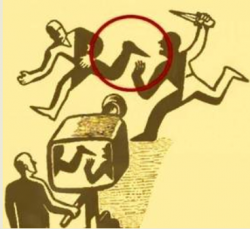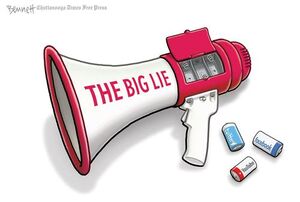Big lie
(propaganda technique) | |
|---|---|
 | |
| Start | 1925 |
| Propaganda technique. | |
A big lie (German:Große Lüge) is a propaganda technique. The expression was coined[citation needed] by Adolf Hitler, in his 1925 autobiography Mein Kampf. He states that a lie that is "colossal" may go unchallenged since no one would believe that someone "could have the impudence to distort the truth so infamously." Hitler asserted the technique was used by Jews to blame Germany's loss in World War I on German Army officer Erich Ludendorff.
Official narrative
 Wikipedia is correct to note that the expression featured in Adolf Hitler's biography, Main Kampf, and almost the whole article is focused on Nazi Germany; as of December 2015, there were only three sentences on usage elsewhere (about Frank Zappa and Thierry Meyssan respectively).
Wikipedia is correct to note that the expression featured in Adolf Hitler's biography, Main Kampf, and almost the whole article is focused on Nazi Germany; as of December 2015, there were only three sentences on usage elsewhere (about Frank Zappa and Thierry Meyssan respectively).
Modern relevance
The "big lie" could refer to a number of modern official narratives, most notably as regards false flag attacks and other casus belli. Russ Baker asked in 2015 about the US government's story of the JFK Assassination: "How is it that a Big Lie of such magnitude could roll along, unflinchingly, after half a century?... It would seem there are more people who believe in Santa Claus and the Easter Bunny than who believe Oswald did it alone."[1]
An example
| Page name | Description |
|---|---|
| "Iraq/WMD" |
Related Quotation
| Page | Quote | Author | Date |
|---|---|---|---|
| Truthdig | “I have studiously avoided blogging about “The U.S. government planned 9/11” conspiracy theories because, frankly, they strain credulity* (Editor’s note: I originally had written “…frankly, they’re crap; no government could keep a secret like that from leaking.” But as anything is theoretically possible, I decided to soften my statement); it seems unlikely to the extreme that the government could keep a secret like that from leaking.” | Blair Golson | 5 September 2006 |